Firstly, an apology for not posting anything since April: as usual, it’s not as if I haven’t been reading during this lacuna. Secondly, recent re-watchings of Avengers Assemble and Thor: The Dark World made me go in search of other film performances with Tom Hiddleston (yes, like the rest of the world, I’m sure), and thus to the BBC’s recent (2012) filmed versions of Shakespeare’s later history tetralogy consisting of Richard II, Henry IV Parts 1 and 2, and Henry V, The Hollow Crown, which I watched on DVD. And that led me to reading the plays – I already had, for some reason, a copy of Richard II in my bookshelves, and thereafter bought the other three.
It’s interesting to see what the three directors (each of whom adapted the plays for television) did with the plays. Rupert Goold, I thought, cut less text from Richard II, but he conflated some characters, and treated Richard’s death in an explicitly martyred way . Richard Eyre made some interesting decisions in filming both parts of Henry IV, and I liked the way Doll Tearsheet appeared as a character in Part I even though she didn’t have any lines. I also liked Thea Sharrock’s Henry V, though her Agincourt scenes suffered by comparison with Branagh’s version of the play, through not having the same scale: having (so far, only skim-) read the play, I did wonder why she’d left out Queen Isabel from the last scenes in France (particularly considering that Henry IV Part 2 had Niamh Cusack as Lady Northumberland for one scene and about three lines!).
That said, these versions of the plays made me think about other filmed versions which I’ve watched – and now I count them up I realise I’ve watched more than I’d realised.
Trevor Nunn’s Twelfth Night, with Imogen Stubbs and Stephen Mackintosh as Viola and Sebastian, Helena Bonham Carter as Olivia, and Nigel Hawthorne as Malvolio.
A Midsummer Night’s Dream directed by Michael Hoffman with Michelle Pfeiffer as Titania, Kevin Kline as Bottom, and a quartet of lovers consisting of Dominic West, Calista Flockhart, Christian Bale and Anna Friel (the whole thing is an all-star cast, if ever you wanted one).
Much Ado About Nothing – Kenneth Branagh’s version and Joss Whedon’s.
Love’s Labour’s Lost as a musical, also directed by and starring Kenneth Branagh (who has done quite a lot of Shakespeare on film, including Hamlet and As You Like It, which I’ve not seen).
Henry V – again, Branagh’s version. I’ve not seen Olivier’s, but the clips I’ve seen have been astonishingly hammy (and Olivier’s voice is surprisingly high-pitched).
Coriolanus directed by and starring Ralph Fiennes, with Gerard Butler, Vanessa Redgrave and Jessica Chastain.
It’s interesting to compare Whedon’s version of Much Ado About Nothing with Branagh’s, since in tone they’re almost complete opposites:
Branagh’s is saturated in warm sunshine and bright colours, Whedon’s is black-and-white (and lit using natural light, which doesn’t set off black-and-white filming as it should);
Branagh’s is loosely period set, whereas Whedon’s is modern day. The casts are generally good, both in terms of characterisation and how they speak the language, but with infelicities (though Keanu Reeves seems to have a lot more fun with Don John than Simon Mather does, and Nathan Fillion is infinitely better as Dogberry than Michael Keaton is): everyone does actually seem to be have had a great time during the filming. I think Branagh’s version works slightly better in conveying the gender politics with respect to poor Hero’s treatment by Claudio and her father – it’s not as believable in a modern-day setting – not to mention Beatrice going to Benedick for restitution for her cousin against Claudio.
Twelfth Night and A Midsummer Night’s Dream are, if I recall correctly, fairly straightforward versions of the plays. In Twelfth Night, the cast is excellent, and the setting interesting. I remember a fabulously awkward bit where Viola, disguised as Cesario, is in attendance on Orsino, who’s in his bath… However, the relationship I remember being most struck with was that between Olivia (Helena Bonham Carter) and Feste (Ben Kingsley), who have a fantastic chemistry together.
A Midsummer Night’s Dream has its setting updated to the early 1900s, and the sets are gorgeous – rich and detailed, and there are plenty of extras giving the sense of a real city and a real court. The cast is packed with well-known names – Stanley Tucci as Puck (who is great), David Strathairn as Theseus, and Sophie Marceau as Hippolyta, amongst others – and they do the language justice. I particularly like Sam Rockwell as Snug, and how he makes the tragedy of ‘Pyramus and Thisbe’ moving despite the mangled words and appalling staging.
Branagh does something very interesting with Love’s Labour’s Lost, which is not one of the most well-known of Shakespeare’s comedies, by making it into a sort of 1930s Hollywood musical. The songs are great, by Irving Berlin, Cole Porter and the like, and link nicely into the verse: Rosaline and Berowne’s exchange about dancing with each other “in Brabant once” segues beautifully into Jerome Kern’s ‘I Won’t Dance’. The set is fairly minimal, but I think that works quite well, given that it’s wordy play with little action, and the costumes are gorgeous (and colour coded!).
It’s an imaginitive way of staging this play, and Branagh’s decisions as to what to excise for the film seem spot-on (my DVD has a deleted scene of the main characters making rather cruel fun of the entertainment provided by the secondary characters, which thankfully isn’t in the main part of the action). Branagh even demonstrates iambic pentameter in one of Berowne’s speeches, accompanying it with taps of his feet. This is one of my favourite films of a Shakespeare play, partly because the cast is delightful and charming (even Matthew Lillard’s clowning is bearable), and partly because the language is done so very well.
Coriolanus, which I watched yesterday, was almost like a war film in its realism (and there was an added resonance in realising, during the credits, that the whole thing had been filmed in Serbia and Montenegro, not so long ago the site of such ruthless and bloody fighting). Fiennes doesn’t shy away from showing Coriolanus’s or Aufidius’s ruthlessness, though there’s an interesting scene when he sees Aufidius’s easy ‘common touch’ with and interest in his people that Coriolanus lacks. Shakespeare’s language is kept intact (I don’t know how much was excised, since I don’t know the play), and the updating to a sort of present-day setting was well done: I particularly liked the use of news bulletins, where even the news anchor (a slightly distracting Jon Snow) and his guests speak in verse.
Fiennes also made Coriolanus an understandable figure, one of those military men who are infinitely more comfortable in uniform and in the presence of other soldiers, unable to deal with civilians and their ways of thinking. The relationship between Coriolanus and his terrible mother, Volumnia (Vanessa Redgrave), was also very well done – there’s more than a hint or two that they are too close (particularly when his wife Virgilia (Jessica Chastain) comes upon her bandaging Coriolanus’ shoulder and leaves them alone – Chastain’s wordless demeanour says volumes here). There’s no colour in Coriolanus’s grim world, and he’s not a sympathetic character – in fact, there’s hardly a sympathetic character in the whole thing, though Brian Cox’s Menenius comes close.
So what makes a good Shakespeare adaptation? In Henry V, Shakespeare’s Chorus says “piece out our imperfections with your thoughts”, since on stage a director is always limited in terms of set and the action which can be shown: on film, there is much more scope to leave less to the imagination. I think this is why Fiennes’ Coriolanus works so well, both as Shakespeare’s play and as a film, since he fleshes out the action fully and very realistically, with a large cast of extras, and the battle scenes are extremely convincing; there’s also a real sense of location and landscape. The more I think about it, the more this film impresses. Then, at the other end of the scale, there’s Branagh’s Love’s Labour’s Lost, which is both stagey and cinematic, in a very consciously old-Hollywood kind of way, but updated for the modern era. Those films which are consciously very faithful to the play do also work, but aren’t, I think, as interesting.
How ‘authentic’ does one make the play? Although Shakespeare’s plays are often nominally set in the past, or in other places, I doubt very much whether they would have been originally staged in that way – with the cast in tunics and cloaks for Ancient Athens, in A Midsummer Night’s Dream, for instance – and so those which update the plays for modern times can work extremely well.*
As long as you get a cast which understands the language and can speak it well – I like the conversational style of speaking Shakespeare’s verse that actors like Branagh do so well, as natural as speech, rather than artificially as ‘poetry’, though others don’t – it makes adaptations so much more memorable. After all, Shakespeare wrote his plays to be staged, not to be read, and a great deal of the meaning depends on having the actors able to convey it. And of course, the themes of his plays, the most popular ones, anyway, still say a great deal about us in our modern life – about leadership, and love, hatred, revenge, ambition, bitterness, pride, youthful excess, even the political elite’s contempt for the masses. The best productions and the best films show us that these are still universal.
*That said, I was amused to note that several people had commented on the BBC’s website about The Hollow Crown’s Henry IV Part 1 (which showing was originally delayed in the UK due to extending coverage of the matches at Wimbledon) that it was “not accurate”. Shakespeare himself was not accurate when it came to period detail, confusing Scroopes and Mortimers, and having people executed who weren’t, not to mention Richard’s death, so I don’t see why modern productions should be held up to better standards of period accuracy.

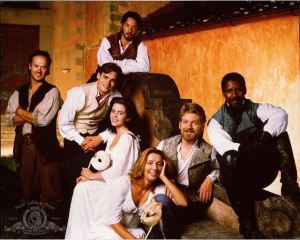
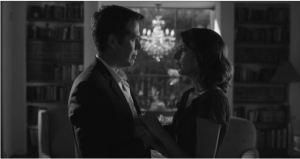
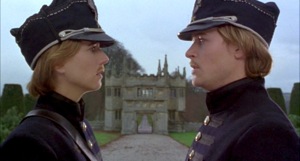
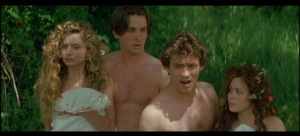
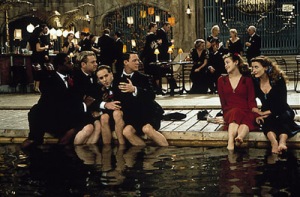
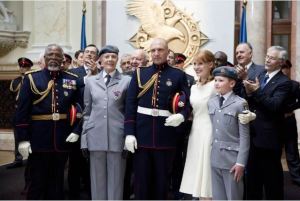
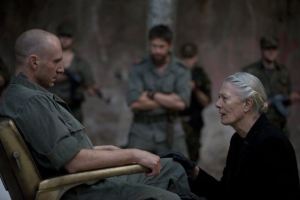
Welcome back Ela! Some great films here and I’m a big fan of Branagh’s Shakespeare incursions (he of course made the first Thor film and has previously also cast cast Hiddlestone in his Wallander series) and great to see his version of Love’s Labour’s Lost getting some well-deserved love here 🙂
Thanks, Sergio! Nice to see someone else enjoyed LOVE’S LABOUR’S LOST – it’s not a play I know well at all, so I suspect if I ever see it staged I’ll be comparing it to Branagh’s version.
I’m slightly ashamed to admit the Hiddleston connection, but it has led me to some excellent films! I remember my amazement when I first watched THOR (on a tiny screen on a flight to or from Doha) and found that Kenneth Branagh had directed it – it seemed so incongruous…
Such an informed and intelligent discussion I thought, Ela, though I’ve not seen many of the films you’ve mentioned. I know what you mean by Olivier’s Shakespeare films, but they were great for the time, with stand-out moments like the ‘wooden O’ of Henry V and the Agincourt and Bosworth field battles. His Hamlet I can take or leave (ditto Mel Gibson’s) but I couldn’t bear to watch his Othello again, even for Frank Finlay’s Iago.
Other films I remember include Orson Welles’ Macbeth — very stark and stagey, budget-capped I suspect and shot in black and white — and, though not Shakespearean, Richard Burton in Marlowe’s Faustus. I saw this last in a Bristol cinema during a freak thunderstorm in 1967, when the thunderclaps outside were louder than the noise made by Faustus being dragged off to hell, and I exited the cinema to find my motorbike in a rising tide of water up to its wheel hubs.
By the way, I was interested in your Hollow Crown comments, especially on Henry V. Our son Cameron was a grip on this episode, filming scenes like the Agincourt battle in Kent. This was the last film the late Richard Griffiths, Uncle Vernon in the Harry Potter films, worked in; he was clearly ill as well as overweight, and kept falling asleep between takes.
Oh, and can I add to the chorus of Welcome Back too!
Thanks for the comments, Chris – I should try more Shakespearean adaptations since I really enjoy them. There’s an Ian McKellen Richard III, I think, that’s appealing. Macbeth, since I studied it at school, is probably the play I know best, but I’ve not seen a good filmed version of it.
I mean to write more about ‘The Hollow Crown’, which I enjoyed enormously. I was pleasantly surprised by how cinematic the productions were, considering that all three directors work primarily in theatre, which is a very different medium.
Marvelous to see you back! My friends and I did a big comparison of the Branagh/Whedon versions of Much Ado. We loved Amy Acker as Beatrice, but Emma Thompson is SO GOOD in that part it’s hard to top her; and Kenneth Branagh is miles and miles better than Alexis Denisof. But yeah, Nathan Fillion is now my ideal Dogberry. Forever.
Thanks, Jenny! I only had the Branagh version on video, and must get round to obtaining a better copy on DVD. Doing a comparison watch would be a great idea, and I might do that… Inspired by this post, I streamed Michael Hoffman’s A MIDSUMMER NIGHT’S DREAM and enjoyed that again. The only real weak note in it is Michelle Pfeiffer as Titania, but she’s not bad, and Kevin Kline is good, but tends to overbalance his scenes (Bottom is that sort of character, though).